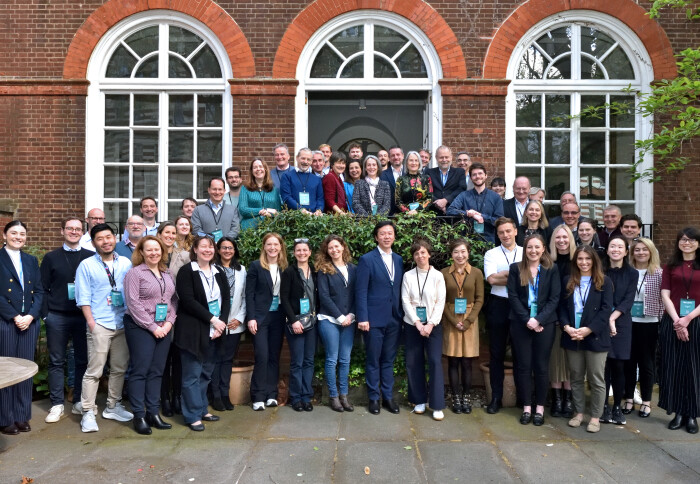Imperial-led global human challenge consortium kick off ambitious 5-year project

Imperial-led MusiCC consortium come together for project kick-off
On 17-18 April, an international group of researchers specialising in human challenge studies convened at Imperial College London.
The Imperial-led Mucosal Immunity in human Coronavirus Challenge (MusiCC) project will lay the groundwork needed to develop advanced, transmission-blocking coronavirus vaccines and is co-funded through the European Union’s Horizon Europe Programme and CEPI (the Coalition for Epidemic Preparedness Innovations).
Across the two days, over 50 members of the consortium from around the world were welcomed to the beautiful 170 Queen’s Gate on Imperial’s South Kensington campus, with a further 30+ joining online in order to officially kick off the project and discuss opportunities and challenges for their work ahead.
“The MusiCC kick-off meeting was a brilliant opportunity for so many members of the consortium to connect in person for the first time,” said Professor Chris Chiu, Professor of Infectious Diseases at Imperial and principal investigator for MusiCC.
“Being such a large consortium, coming together face-to-face was vital for building relationships and many exciting conversations about our way forward. I believe all in attendance left with a collective sense of excitement about the future of the project and are eager to get started.”

A global consortium addressing global problems
After a few obligatory coffees and pastries, the meeting was opened by Professor Hugh Brady, President of Imperial College London, who spoke enthusiastically about how MusiCC aligns with Imperial’s newly launched strategy, ‘Science for humanity’ and the remarkable impact MusiCC will have on the future of epidemic preparedness.
“MusiCC is a fantastic example of Imperial’s ability to bring people and organisations together to create real-world impact,” said Professor Brady. “I very much look forward to following the progress of the project and no doubt hear of their great accomplishments across the next five years.”
The consortium also heard from Dr Richard Hatchett, Chief Executive Officer of CEPI, who provided insight on the significance of this project and how it connects with their 100 Days Mission to prepare, transform, and connect the world so that it can respond to the next disease by compressing the development of safe, effective, globally accessible vaccines to as little as 100 days.
After hearing from President Brady and Dr Hatchett the consortium jumped into the detail of the project, having stimulating discussions and receiving feedback from the Scientific Advisory Board. Upon closure of the meeting, the two days were marked by a shared eagerness to begin work on the project felt throughout the consortium.
The Research Impact Management Office (RIMO) from Imperial’s Enterprise Division will lead the project management and communications activities for the project. You can keep up to date with the project by following MusiCC on X and LinkedIn.
Article text (excluding photos or graphics) © Imperial College London.
Photos and graphics subject to third party copyright used with permission or © Imperial College London.
Reporter
Harry Jenkins
Enterprise
Alexandra Halbish Rayner
Enterprise